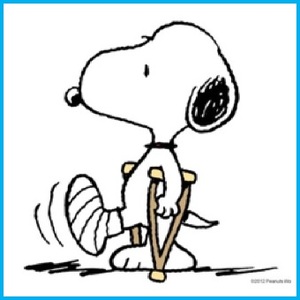My usual reaction to being offered help was to politely dismiss it, even before thinking about it.
I had picked up this mindset as my default.
But here’s how I was forced to face that social programming, and choose a different way to engage.
Defaulting to self-sufficiency
I was attending a week long retreat, with fourteen other women who were strangers to me when it started. We were staying at a beautiful and secluded property to experience the full effect of “retreating” away from our regular worlds. We had all hit the Pause Button to spend a week recharging, reflecting, and resetting our perspectives.
On the third day, I sprained my ankle – big time!
I truly couldn’t walk. I couldn’t hobble.
I had to go to the nearest clinic to check that it wasn’t broken. (Grateful that it wasn’t!) And came out with an air cast.
When I got back to the retreat center, I was immediately inundated with fourteen versions of “How can I help you?”
My instinctive reaction was to deflect. I said, “Thank you, but I’ll be fine.” Apparently my sense of self-sufficiency was so strong, that even with a sprained ankle, I didn’t think I needed help!
The retreat program included mindfulness exercises. And at the end of the day I finally noticed that I was smack in a growth opportunity.
Leaning toward help
I came to realize that I had a responsibility not be self-sufficient. It was on me to clearly articulate ways I could be helped.
I had offered to support others so many times, but only now did it occur to me that there are two sides to it being effective.
So I allowed myself to be vulnerable. I allowed myself to follow my instincts and not judge my own asks. I gave this new mindset a try.
I asked others to cover my shifts doing dishes. I asked to sit in the front seat of the van. I asked for experienced hands to wrap my ankle. I asked for my water bottle to be filled.
The list may sound trivial, but none of the requests came out of my mouth easily. Yet every time, multiple people were energized to be of service.
More fully leaning toward help
Just to be sure the lesson had sunk in, I had a chance to deeply practice it again two years later.
I broke my leg – big time!
I had surgery to get a plate and screws in there. I was sent home with pain medication, and strict instructions not to put any weight on that foot for three months.
My energy levels and ability to focus were all over the place. It took a lot of energy just to get from my bed to the kitchen, where I’d feel like having a nap again rather than try to make anything to eat. Changing a lightbulb and getting my mail fell right off my To Do list.
Unlike at the retreat though, I quickly leaned into support. I pushed myself to assess what I truly needed; what I could receive as others offered to help.
I spread the message that I needed – hot meals (otherwise I’d eat cheese and crackers all day everyday), social / mental health check-ins (in-person and online), and basic housekeeping (have you ever tried to make a bed standing on one leg?)
My skill in not only answering the question, but proactively asking for help had definitely improved. I know that my recovery from the broken leg directly benefitted from the practice with the sprained ankle.
We need to offer help and to receive help
If everyone generally wants to be helpful to others, then the corollary is that everyone wants help from others. We need both to be true.
And it shouldn’t only be when hospitals are involved!
Exercise for gratitude muscle
Here’s an exercise to strengthen your gratitude muscle:
- Today, identify a project that you’re working on.
- Then, start a list of how a colleague or friend could help or support you. Even though you probably feel you could accomplish it without their help, what aspect or element could benefit from some help? Maybe it’s copy editing, or graphic design, or brainstorming.
- Keep adding to the list for a few days.
- Then, actually ask for help from someone with one of the things on your list.
- At the end of the week, notice what felt easy and what felt hard, and how you feel about the quality of the project and your relationship with the person you asked.


